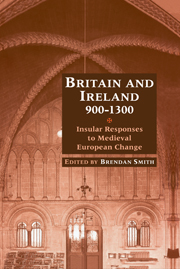Book contents
- Frontmatter
- Contents
- Contributors
- Preface
- List of abbreviations
- 1 The effect of Scandinavian raiders on the English and Irish churches: a preliminary reassessment
- 2 The changing economy of the Irish Sea province
- 3 Cults of Irish, Scottish and Welsh saints in twelfth-century England
- 4 Sea-divided Gaels? Constructing relationships between Irish and Scots c. 800–1169
- 5 The 1169 invasion as a turning-point in Irish-Welsh relations
- 6 Killing and mutilating political enemies in the British Isles from the late twelfth to the early fourteenth century: a comparative study
- 7 Anglo-French acculturation and the Irish element in Scottish identity
- 8 John de Courcy, the first Ulster plantation and Irish church men
- 9 Coming in from the margins: the descendants of Somerled and cultural accommodation in the Hebrides, 1164–1317
- 10 Nobility and identity in medieval Britain and Ireland: The de Vescy family, c. 1120–1314
- Bibliography
- Index
1 - The effect of Scandinavian raiders on the English and Irish churches: a preliminary reassessment
Published online by Cambridge University Press: 30 July 2009
- Frontmatter
- Contents
- Contributors
- Preface
- List of abbreviations
- 1 The effect of Scandinavian raiders on the English and Irish churches: a preliminary reassessment
- 2 The changing economy of the Irish Sea province
- 3 Cults of Irish, Scottish and Welsh saints in twelfth-century England
- 4 Sea-divided Gaels? Constructing relationships between Irish and Scots c. 800–1169
- 5 The 1169 invasion as a turning-point in Irish-Welsh relations
- 6 Killing and mutilating political enemies in the British Isles from the late twelfth to the early fourteenth century: a comparative study
- 7 Anglo-French acculturation and the Irish element in Scottish identity
- 8 John de Courcy, the first Ulster plantation and Irish church men
- 9 Coming in from the margins: the descendants of Somerled and cultural accommodation in the Hebrides, 1164–1317
- 10 Nobility and identity in medieval Britain and Ireland: The de Vescy family, c. 1120–1314
- Bibliography
- Index
Summary
Assessments of the effects of Scandinavian raiders in the ninth and tenth centuries have focused for over three decades on an agenda set by revisionist historians – an agenda which has obscured and sometimes trivialized many of the complex issues involved in an analysis of annalistic and other records. An over-zealous approach, driven by a desire to show that Scandinavian raiders were not numerous and that they were no more destructive to church property and personnel than were the native Christian opposition, has too often led to conclusions which fly in the face of historical evidence and common sense. Revisionists must also take responsibility for polarizing historical arguments in relation to the destructive power of the Northmen. In their zeal to promote an image of Scandinavian raiders as yet one more political, cultural and religious grouping in Western Europe – little different from their Christian neighbours in most respects – they either minimized evidence which did not fit their preconceptions or else they distracted historians' attention away from those negative effects which Vikings wrought on Western society, to concentrate on the economic and material benefits which later Scandinavian colonists supposedly brought to a conquered people. At best, the books in ‘Viking’ studies fail to balance: at worst they are intellectually cooked.
- Type
- Chapter
- Information
- Britain and Ireland, 900–1300Insular Responses to Medieval European Change, pp. 1 - 38Publisher: Cambridge University PressPrint publication year: 1999
- 5
- Cited by



